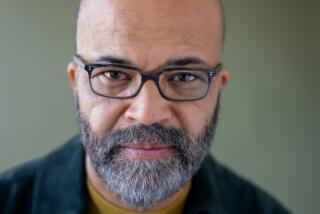TIFF 2013: Assange pic ‘Fifth Estate’ a crystal ball into fall
TORONTO -- It’s fitting that the Toronto International Film Festival opened its 2013 edition Thursday night with the Wikileaks drama “The Fifth Estate.”
That’s true because the Bill Condon movie about Julian Assange is an elaborate Hollywood production with a layer of seriousness -- “interested in what makes people tick,” as TIFF’s Cameron Bailey described its director before the screening -- and Toronto tends to like elaborate Hollywood productions with a layer of seriousness.
But it’s also true because the moviegoing season that Toronto unofficially kicks off is going to be filled with movies like this -- based on complicated real-life personalities, and trying, with admittedly varying degrees of success, to tell us as much about ourselves as about them.
It’s hard to sugarcoat the matter. “Fifth Estate” -- in which up-and-comer Benedict Cumberbatch stars as the polarizing Assange, hacking and smarmy-ing his way around the world -- is a bit of a hodgepodge.
INTERACTIVE: From Toronto to the Oscars? Well...
The Oct. 18 release received some lukewarm reviews after its gala at this city’s Roy Thomson Hall and, with its moments of trumped-up suspense and professorial exchanges, you can understand why. There are incidents played for tension that are not quite substantiated, and choices about what to point up and what to leave out that will give fuel to the naysayers.
On the other hand, making a movie about a set of facts is never easy, because a sprawling real-life story doesn’t lend itself to the neat confines of three-act cinema. If one of “Fifth Estate’s” struggles is how to be truthful to the messiness of the Assange tale while still being good entertainment, it certainly isn’t the first movie to face the challenge.
Needless to say, it also won’t be the last, not even in the coming months. These issues of fact-based storytelling will pop up throughout the festival and the season that follows, in other films that also walk the line between good drama and honorable truth and get us upset because they leaned too far one way or another: the balance of skepticism and hagiography in “Mandela,” the ambiguous heroism at the heart of “Dallas Buyers Club,” even the work-versus-play archetypes of “Rush.”
The debate will really heat up with movies focused on ongoing events, in which ideology has not yet cooled into rationality and when facts have not settled into consensus. (Just ask the filmmakers behind “Zero Dark Thirty.”)
Whatever your thoughts on filmmakers’ expression of these events, they are, at least, offering a kind of engagement. Hollywood has long been accused of coming too late to the party on stories of topical interest, hashing things out in development for so long nobody cares anymore.
Development can of course be tortuous, but the subjects can also feel relevant. Even the period pieces are of the moment. As Condon said at the screening, “We see in the Edward Snowden case that this is a story that continues to be central. I didn’t want to give answers but raise questions. ... I wanted to start a conversation.”
We’ll be having plenty more.
ALSO:
Play the Toronto Film Festival? It’s an exacting calculation
TIFF 2013: Charting promise, potential pitfalls of contenders
TIFF 2013: Sylvain Chomet’s live action Atilla Marcel debuts
Twitter:@ZeitchikLAT
More to Read
Only good movies
Get the Indie Focus newsletter, Mark Olsen's weekly guide to the world of cinema.
You may occasionally receive promotional content from the Los Angeles Times.







